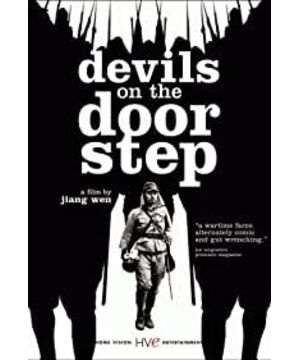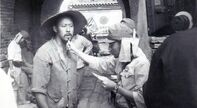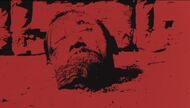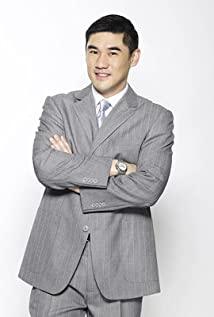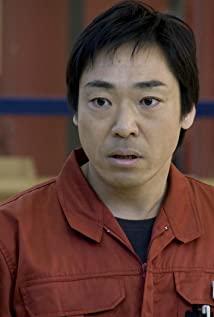——I
said that this film was banned because the authorities affirmed Jiang Wen for this film. Of course, that was a joke. But this joke is not too much. The obvious fact is that this film does have an influence that deserves to be banned from being released in domestic theaters, and the thinking it can cause is definitely impactful.
Sometimes I can't help but sympathize with the seniors of the film review committee. What would ordinary people think if they saw such a film? Nine times out of ten, they curse the government for allowing such films that vilify farmers to go online. But for another progressive youth, such an excellent film with a spirit of reflection, a milestone film in the history of Chinese film, could not be released in China.
In a word, for this film, whether it is forbidden or not, it shows the attitude of the authorities, and it has nothing to do with Jiang Wen's genius or the achievements of this film.
The whole context of the story is very absurd, but when you examine each person's behavior and psychology, it seems extraordinarily real, and even flesh and blood makes people feel that it is not just a political metaphor, but that it has happened.
The reason why Ma Dasan was talking about the incident was fun to say, lighting the lamp to have an affair, which attracted "me". "I" pointed a gun at Ma Dasan's head and dropped two sacks. Inside the sacks were a Japanese devil and a traitor translator.
From here, the grievances and grievances between a group of peasants and two captives in the Japanese-occupied areas began.
The most outstanding part of this story is the shaping of the characters. Each character in the film has a distinct personality and is also very dramatic. What is even more rare is that the protagonist Ma Dasan also changes with time and things, and his personality and mentality are gradually changing. change.
At the beginning, Ma Dasan was no different from all the old and young people in Hangjiatai. They were equally timid and selfish. Obviously, "I" only said that I wanted his life, but in front of the villagers, it became "I want the life of the whole village".
Ma Dasan is cowardly and kind. The flower house was going to find life and death, but Ma Dasan was willing to be frozen by himself, and he also wrapped his quilt all over the two of them, and also wrapped the pillars.
Not only that, Ma Dasan also endured starvation himself, and borrowed a pound of white noodles, which was rare in that era, to make dumplings for the devils and traitors, fearing that the flower house would starve to death.
Huawu tried their best to escape, threatening the safety of Ma Dasan. After discussion in the whole village, they decided to deal with the two of them. Finally, they drew lots and sent Ma Dasan to do it. However, Ma Dasan did not dare to kill and even hid the two of them. Get up, eat and drink, and keep the feces and urine.
Until Huawu wanted to escape for the third time, Ma Dasan's only courage was that he wanted to escape with Yu'er and Niang.
When the villagers met, they proposed to exchange the prisoners for food, and a few people sent the flower house to the Japanese military camp. It was obvious here that Ma Dasan's daring courage, especially compared with his cowardly villagers.
Finally, after he led the wolf into the house and the whole village was slaughtered, Ma Dasan was rejuvenated and became a two-minute revenge hero.
Many people think that this film is a serious ugliness for the peasants during the Anti-Japanese War, but in my opinion, comparing Ma Dasan with them, it is actually terrifyingly real. If the background of the story is not after the surrender of Japan, then this may be a classic story of a cowardly and incompetent peasant turned into an anti-Japanese fighter.
From this absurd plot, let's talk about the ridiculousness of these peasants and the Japanese army and the national army.
Uncle Wu is an elder in the village. He knows a lot of writing and can speak a few words. He looks like a cultural decision-maker in the village. This kind of image of the feudal patriarch is very typical. It looks a little prestige on weekdays, but it is nothing more than a sham when it happens. This is one of the reasons why the feudal patriarch in the countryside quickly disappeared after the Anti-Japanese War.
Two necks, six prosperous. These two people are quite interesting. Erneck is a traitor who flatters the Japanese, while Liuwang seems to be the liaison between the village and the anti-Japanese armed forces. Why are these two people talking together? Because of their behavior in the film, they are basically the same, and they are the same. On the one hand, when everyone was discussing who would execute the Japanese devils, both of them boasted that they were not afraid, but each found a reason to prevaricate. On the other hand, when they knew that Ma Dasan didn't execute the Japanese devils, they put their heads on the table and forced Ma Dasan to chop, looking like they were going to die. It can be said that these two people have both face and no ability, and they are still playing tricks in front of their relatives and friends, which is very annoying, but today, do you not talk about such people? Simply hateful.
Brother-in-law of the fourth cousin and Liu Yidao, these two people are just as full of life as they are, but full of drama. They have one thing in common, bragging. But today, all the bragging masters you can meet, whether they are intellectuals, craftsmen and businessmen, or simple stubborn masters, you can see their shadows. Bullying Ma Dasan, an illiterate farmer who is illiterate and ignorant, is a set of rules. Those principles, such as "If I don't accept your order, you can trust me to keep it secret for you" seems to be quite bluffing. , But can anyone who has seen the world believe it? Keep it confidential or not, are you looking at the confiscation of the sealing fee? It depends on your character and conduct. Some people will betray you even if they charge you. It's just commonplace. As for the gunner who can pierce Yang at a hundred paces, and can't put a gun in the place where the fart is big, it is even more inferior. Similarly, there are the eight ministers of Liu Chui, who bully peasants like Ma Dasan, and are especially despicable. The two of them forcibly brag, cheating, eating, drinking, cheating and respecting. They also dare not kill the Japanese devils when they are finished, and they have to brag about their lives and not deserve to die (obviously wiping their necks with the back of a knife), which is especially sad. At the end of the film, Ma Dasan learned how to croak as a donkey, but the fourth cousin and brother-in-law actually described it as a roar in the sky, which is enough to see, where does the moisture in the stories we know today come from?
The mother of the second neck, because of the excellent performance of the actors, gave me a very deep impression. This middle-aged and elderly rural woman, with ignorance, once said, "I'm sitting on the head of the kang waiting for him, he wants my life, how dare he?" "It's been eight years since the Japanese came to our village. On earth, he dared to touch a single hair of my hair, I walked right, and wherever I went, he had to give me a high look." Then in the midst of the massacre, he was stabbed to death with two bayonets. When it comes to this character, I want to talk about the absurdity of the film. Although the character's words may be purely bragging, and the later encounters are also extremely ironic, this place alone can indeed give people a sense that the Japanese army did not commit any crimes in autumn. The feeling, even made me have, that such a rural aunt was stabbed to death was a pure and well-deserved idea. It is a shining point, and a failure.
Hanaya Kozaburo, a Japanese farmer who was drafted into the army. At first, he only wanted to die quickly, and then he wanted to live again. It seems contradictory, but in fact, he was afraid of death from the beginning to the end, and only wanting to die quickly is a kind of fear of death. Huawu hated the Chinese at first, then thanked the villagers for not dying, and finally raised the butcher's knife to the villagers. From him, we can see the sadness of the Japanese army as a killing machine. On the one hand, it is a swaying kindness, able to repay kindness and gratitude. At the end, there is even a kindness that refuses to hurt an ant, but it is extremely obedient to orders and has no humanity. to kill his benefactor. Similarly, there is the Japanese army squad leader, who on the one hand pretends to be a samurai and keeps his promise to deliver food, on the other hand is a brutal executioner who slaughtered innocent villagers. At the end, he also said that he had received an order not to use weapons and could only use a saber, which is enough to see the degree to which human nature was destroyed by orders under the military system. As for the Kuomintang officers, the same is true.
In the end, it was the Mad Seventh Master. No one looked down on him, and anyone could yell at him because he was disabled and because his son died. He repeatedly said that he strangled one with one hand and buried it in a pit. No one believed him. As a result, when the Japanese devil slaughtered the village, he was the only one who resisted, and he really strangled a Japanese devil. I don't want to say more about the irony here, I can only say it's sad.
Many people have discussed who "I" is.
Who is "I" and does it matter? To me, who I am is what matters. The story is about the end of the Anti-Japanese War, but what I see is the present. Many people think that our nation has no blood. For a long time, I couldn't understand where this "feeling" came from? Because for me, putting myself in my shoes and not saying that killing people is like slaughtering dogs, it is always easy to start.
Later, I gradually understood that when Emperor Hui of Jin said why he didn’t eat minced meat, it was because he had limited intelligence and could only save others with himself. For the general public, the result of saving others with oneself was like this, “slavery”, “no Reading", "no blood", "unruly", etc., are actually themselves. The seemingly absurd characters and behaviors of these people in the film are actually set up because of the historical background. .
There is no need to be in a specific historical background. Among us, there are incompetent leaders, men who are stern, ignorant and arrogant, intellectuals who boast and deceive people, and people in the system who obey orders. Why not? As for men who are full of blood, and women who are brave and kind and pursue free love, there are naturally not no.
When I watched this movie, I often thought that the Kuomintang and the Communist Party, or collectively known as the Anti-Japanese Armed Forces, rely on these people to resist aggression. Is it possible that the victory will also be a tragic victory, and that the victory will be a fluke? But then I think about it, the people today are still like this, so what is democracy and freedom, one person, one vote, isn't it India? I think that this movie is for real thinkers, and it is a psychedelic dream that dreams of democratic votes and a good life given or won by others.
With people like this, what are they scolding the authorities, what are they mocking about the Communist Party, and what kind of votes do they want? It's all empty.
The way we Chinese think, when we see "how good the Chinese are", we always feel honored, and when we see "how the Chinese lose face", we can scold people together again. Self-reflection is such a rare thing.
Therefore, no matter how good the film is, it is useless to scold the authorities, scold Japan, scold the foolish man and the foolish woman, scold the angry youth, and scold anyone. We are too accustomed to detaching ourselves from one thing and then scolding others without any burden. Even in the face of Japanese aggression, which is a national peril, there is always someone who can safely find a position. Curse Xi and watch how he died.
When there is no way to go, bring the way into your heart.
Introspection looks helpless, but it is the most powerful.
I said, I can't help but it has nothing to do with the meaning of this movie, because introspection is not something that can be awakened by anyone who sees "The Devil Is Coming", but for those who want to be shocked and enlightened If you are a person, you will always find this movie, abuse your own heart once, and reflect on your own shortcomings and mistakes from the pain and suffering.
Those foolishness to treat evil with kindness, those foolishnesses who feared the power to survive but waited to die, those foolishnesses who boasted and deceived the country and misfortunes, those foolishnesses who blindly followed orders full of benevolence and righteousness but destroyed their conscience, those foolishnesses who were indifferent and ruthless but blamed heaven and earth
... In front of this film, all the words appear pale, those who introspect have felt the shock and strength, while those who are angry can only feel black and white.
View more about Devils on the Doorstep reviews


